Stress is one of the most common ailments affecting individuals in the modern world, infiltrating daily life with subtle persistence and, at times, overwhelming force. Whether from professional obligations, personal struggles, or the relentless demands of our digital culture, chronic stress not only disrupts mental well-being but can wreak havoc on the body’s biological systems. Amid the growing demand for natural and holistic solutions, both adaptogenic mushrooms and nuts energy food have risen to prominence as potent allies in supporting stress relief and restoring balance. In this comprehensive guide, we explore how these powerful natural tools work in harmony to support the nervous system, boost physical and mental energy, and foster a sense of calm resilience.
Adaptogens, a class of herbs and fungi that help the body resist stressors of all kinds, have been used for centuries in traditional medicine. Meanwhile, nuts—rich in healthy fats, proteins, and micronutrients—serve as a compact and versatile energy source. When considering “nuts energy food” as part of a stress-relief protocol, it’s important to look beyond simple nutrition facts and examine how bioactive compounds in nuts interact with neurochemical pathways, inflammation, and hormonal stress responses. By integrating both adaptogenic mushrooms and strategic nut-based energy foods into daily routines, individuals can access a holistic, scientifically grounded strategy to support long-term stress resilience and overall vitality.
You may also like: Unlock Powerful Stress-Relief with Adaptogenic Mushrooms and Stamina Herbal Support

Understanding Adaptogenic Mushrooms: Nature’s Stress Regulators
Adaptogenic mushrooms occupy a unique space in the world of natural remedies, offering physiological benefits that go far beyond the scope of traditional supplements. Unlike stimulants that create temporary boosts or sedatives that may induce lethargy, adaptogens function by modulating the body’s stress response systems—primarily the hypothalamic-pituitary-adrenal (HPA) axis. This axis governs how we react to both physical and psychological stressors, and adaptogens help “train” this system to be more resilient, efficient, and balanced.
Mushrooms such as reishi, lion’s mane, cordyceps, and chaga are particularly effective adaptogens. Reishi, often referred to as the “mushroom of immortality,” has been used in traditional Chinese medicine for over two millennia. Its triterpenes and polysaccharides contribute to anti-inflammatory and immune-regulating effects, while also showing potential for modulating cortisol levels—a key hormone in stress regulation. Lion’s mane, on the other hand, contains hericenones and erinacines that stimulate the production of nerve growth factor (NGF), promoting neural repair and reducing anxiety-related behaviors in animal models. Cordyceps is recognized for enhancing ATP production, improving endurance, and combating fatigue, all of which are relevant for individuals whose stress is coupled with physical burnout. Lastly, chaga supports antioxidant defenses and may help regulate blood sugar levels, indirectly supporting hormonal balance.
Modern research supports these effects, with numerous peer-reviewed studies demonstrating the neuroprotective, adaptogenic, and immunomodulating properties of these mushrooms. While the mechanisms of action vary, the underlying theme is consistent: these fungi support the body’s ability to adapt to and recover from stress without depleting energy reserves or compromising other physiological systems.
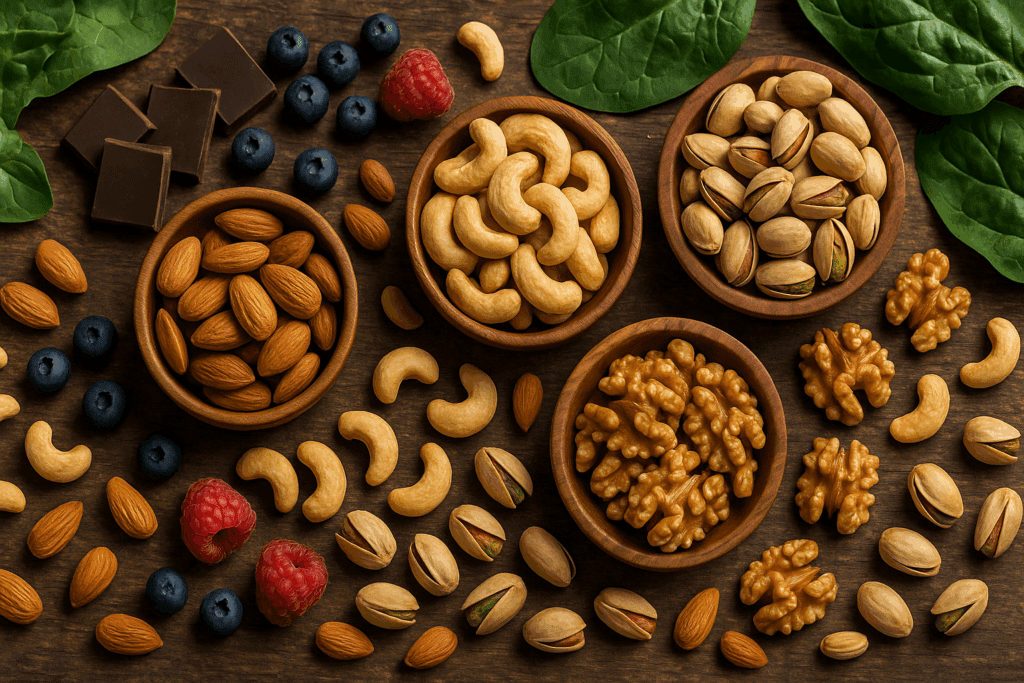
Nuts Energy Food: A Critical Ally in Stress-Relief Nutrition
When it comes to dietary strategies for energy and stress relief, the term “nuts energy food” encapsulates a crucial concept: nutrient density and energy efficiency. Nuts such as almonds, walnuts, pistachios, and cashews are not only calorie-dense, but they are also rich sources of healthy fats, protein, fiber, magnesium, vitamin E, and polyphenols—compounds known to influence brain chemistry and physiological resilience.
Magnesium, in particular, plays a central role in regulating the body’s stress response. Low magnesium levels are consistently associated with elevated anxiety, irritability, and sleep disturbances. Nuts are among the best natural sources of this essential mineral, with a single ounce of almonds or cashews providing nearly 20% of the recommended daily intake. Moreover, vitamin E found in nuts acts as a potent antioxidant, protecting neural tissues from oxidative damage that is often elevated during periods of chronic stress.
The macronutrient profile of nuts makes them ideal for sustained energy. Unlike high-sugar snacks that cause blood sugar spikes and crashes—phenomena that exacerbate mood instability—nuts provide a slow, steady release of glucose, paired with healthy fats that stabilize energy over longer periods. This makes them particularly suitable for mid-afternoon slumps or as pre-workout fuel. In fact, when people ask “do nuts give you energy,” the answer lies not only in their calorie content but in their ability to nourish metabolic pathways that support endurance, focus, and calm alertness.
Numerous clinical trials have examined the cognitive and emotional effects of nut consumption. Studies on Mediterranean diets rich in walnuts and almonds have shown improvements in depressive symptoms, cognitive performance, and overall mental health scores. By integrating nuts energy food into a balanced diet, individuals are tapping into a bioavailable, efficient form of nourishment that speaks directly to the brain and nervous system’s needs under stress.
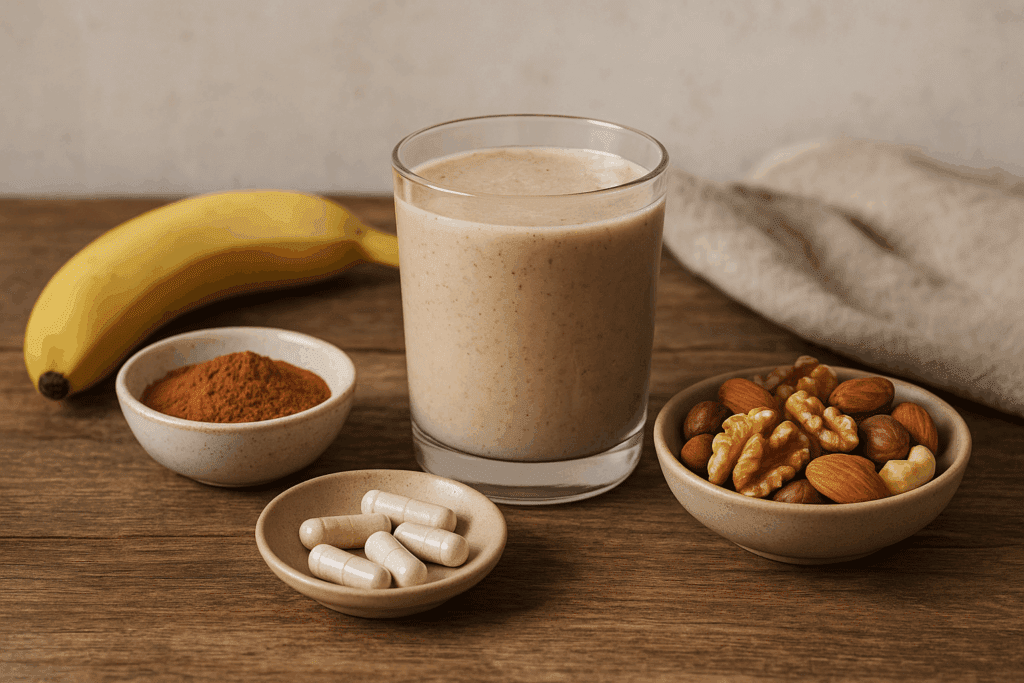
The Synergistic Power of Combining Adaptogens and Nuts Energy Food
While both adaptogenic mushrooms and nuts energy food offer distinct benefits, their synergy creates a robust foundation for stress management. Adaptogens help regulate the physiological response to stress by recalibrating hormonal and neurotransmitter systems. Simultaneously, nuts supply the nutrients necessary for these biochemical systems to function optimally. This dual action supports not just stress reduction, but also mental clarity, emotional balance, and physical stamina.
For example, pairing reishi mushroom extract with a handful of magnesium-rich cashews creates a calming, restorative snack. The reishi helps modulate cortisol while the cashews replenish depleted magnesium stores and provide stable energy. Likewise, lion’s mane powder mixed into a walnut-banana smoothie offers a brain-boosting, anti-inflammatory breakfast option. Lion’s mane enhances NGF activity while walnuts provide essential omega-3 fatty acids, which support mood regulation and cognitive resilience.
This approach to stress relief moves beyond isolated interventions and into the realm of holistic lifestyle medicine. It’s about understanding the interplay between nutrients, hormones, and neural circuits and designing habits that nourish all three simultaneously. Rather than relying on single-purpose supplements or processed “energy” products, this synergy provides a functional, bio-intelligent strategy rooted in nature and supported by evidence.
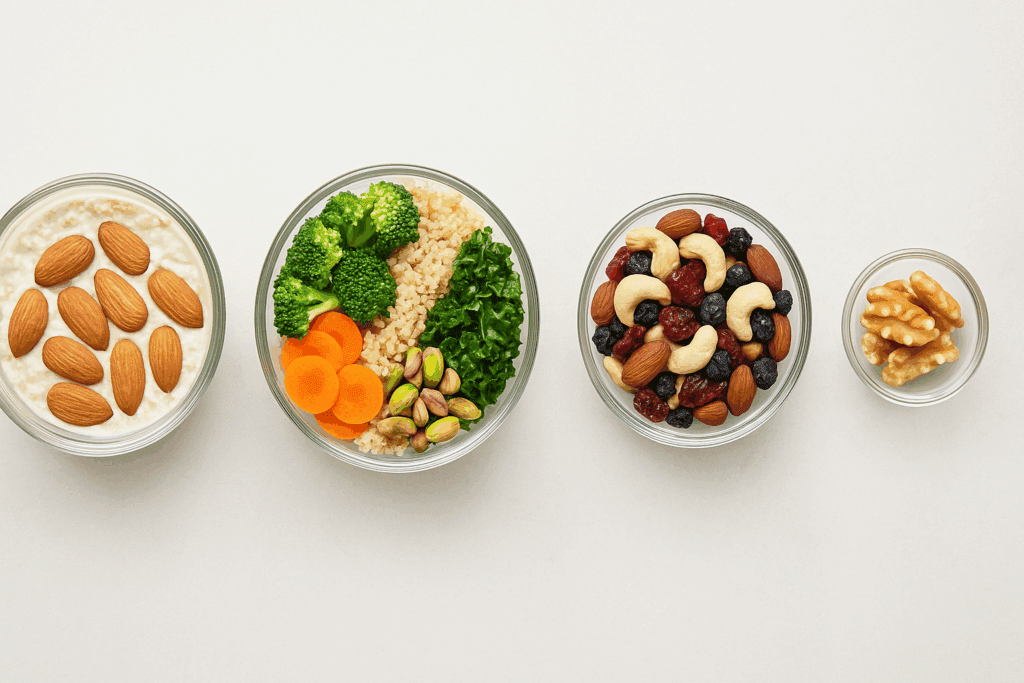
How to Incorporate Nuts Energy Food into a Daily Stress-Relief Routine
Creating a sustainable routine that includes nuts energy food involves both intention and experimentation. While the health benefits of nuts are well-documented, their impact depends on how and when they are consumed. Simply snacking on salted peanuts while stressed at work is not the same as consciously integrating nutrient-rich nuts into a well-rounded, anti-stress lifestyle.
Morning is an ideal time to consume energy-supportive foods. A breakfast consisting of overnight oats with sliced almonds, chia seeds, and a drizzle of walnut oil can stabilize blood sugar and provide mental clarity for hours. For those who prefer savory options, incorporating chopped pistachios into a quinoa-vegetable bowl adds crunch, flavor, and a powerful dose of stress-fighting nutrients.
Afternoon energy crashes—often caused by cortisol fluctuations—are another prime opportunity for targeted nutrition. Instead of reaching for caffeine or processed sugar, a small handful of trail mix made from raw cashews, pumpkin seeds, and dried berries offers both instant and sustained energy. The magnesium and tryptophan in cashews can also support serotonin synthesis, fostering a more positive mood as the day wears on.
Even in the evening, nuts can play a calming role. Walnuts, for instance, contain melatonin and omega-3s that support sleep onset and quality. Consuming them an hour before bed, perhaps in the form of a small nut-based snack or mixed with adaptogenic golden milk, can gently nudge the body into a state of rest and recovery.
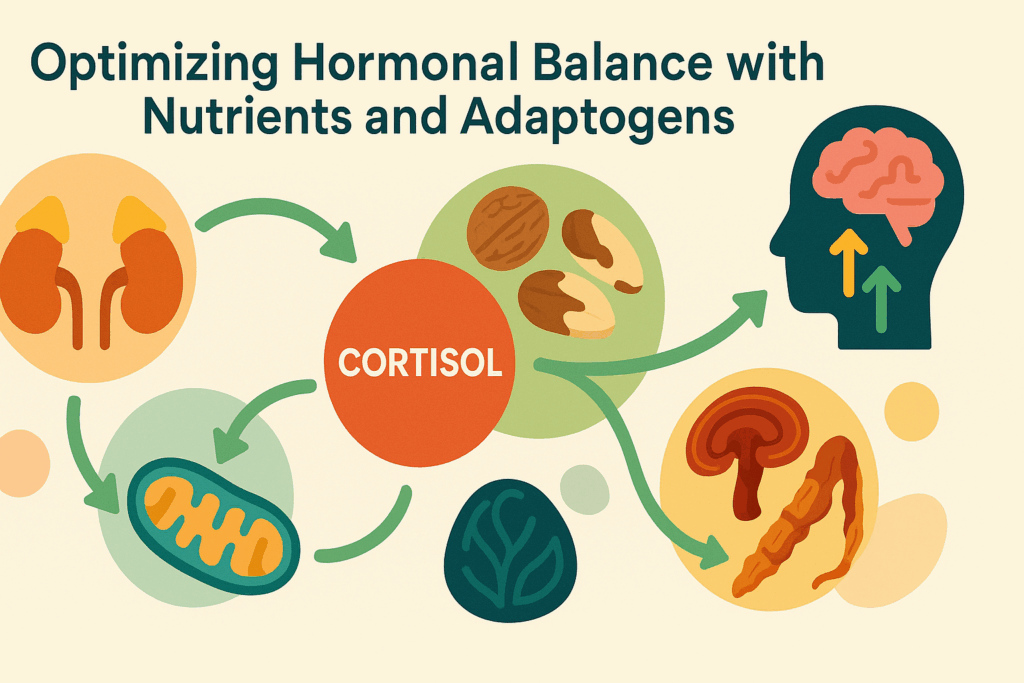
Optimizing Hormonal Balance with Nutrients and Adaptogens
Stress is fundamentally a hormonal event, and its effects cascade through multiple endocrine systems in the body. Cortisol, the primary stress hormone, is released from the adrenal glands in response to signals from the brain. While short-term increases in cortisol can be adaptive—sharpening focus and mobilizing energy—chronic elevations lead to impaired immune function, poor sleep, weight gain, and mood instability. The delicate task of managing cortisol production and sensitivity is one reason why adaptogenic mushrooms are so valuable. They interact with cortisol pathways in a regulatory rather than suppressive way, helping the body normalize its response.
Meanwhile, the role of nuts energy food in hormonal balance is multifaceted. Nuts provide essential fatty acids, particularly omega-3s, that are integral to hormone production and cell membrane integrity. Hormones rely on fat-based carriers and receptors to function properly, and deficiencies in these foundational elements can disrupt communication across the endocrine system. Walnuts, flaxseeds, and chia seeds all supply alpha-linolenic acid (ALA), a plant-based omega-3 that supports neurological and hormonal health.
Furthermore, nuts contribute zinc, selenium, and manganese—micronutrients involved in thyroid regulation and reproductive hormone synthesis. Brazil nuts are especially notable for their selenium content, a mineral that supports both antioxidant defenses and thyroid conversion processes. Since stress can inhibit thyroid function by suppressing the conversion of T4 to T3, nutritional strategies to counteract this suppression are critically important.
Incorporating adaptogens and nuts energy food together can create a harmonizing effect. For example, cordyceps mushrooms—known for supporting adrenal stamina—pair well with selenium-rich Brazil nuts, particularly in individuals experiencing adrenal fatigue. This combination promotes both immediate energy production and long-term hormonal recalibration, reducing the feeling of being perpetually “wired and tired.”
Case Studies in Functional Nutrition: Mushrooms and Nuts for Stress Recovery
To better understand the real-world applications of these principles, let’s explore a few case scenarios in which individuals have used a combination of adaptogenic mushrooms and nuts energy food to restore balance and improve their well-being.
Consider Sarah, a 34-year-old software engineer who began experiencing chronic fatigue, disrupted sleep, and mood swings during a particularly stressful product launch. Rather than turning to caffeine and over-the-counter sleep aids, she consulted with a functional nutritionist who recommended daily supplementation with reishi extract and a diet emphasizing magnesium-rich foods, including almonds and pumpkin seeds. Within six weeks, Sarah reported improved energy consistency, fewer mood crashes, and a deeper sense of calm, all without major changes to her workload.
In another case, David, a university lecturer in his 50s, struggled with anxiety and mid-day exhaustion. After experimenting with different adaptogens, he found that lion’s mane significantly improved his mental clarity, particularly when consumed with a smoothie containing walnuts and spinach. This combination not only enhanced his lectures and focus but also reduced the tension headaches he had previously endured during stressful semesters.
These examples are not isolated. Many health coaches and integrative practitioners report similar outcomes when clients are guided toward strategic dietary shifts and targeted adaptogen use. What sets these interventions apart is their sustainability. Rather than offering temporary relief, they nourish the very systems that regulate stress, gradually restoring balance from within.
The Science Behind “Do Nuts Give You Energy?”
The question “do nuts give you energy?” may seem simplistic, but unpacking it reveals a sophisticated interplay between metabolism, neurotransmission, and endocrine signaling. Unlike simple carbohydrates or synthetic stimulants, nuts provide energy through metabolically efficient and sustained mechanisms.
First, the high-fat content of nuts slows gastric emptying, meaning the energy from nuts is released gradually, avoiding blood sugar spikes and crashes. This is especially important for individuals who experience reactive hypoglycemia or fatigue after carbohydrate-heavy meals. The monounsaturated and polyunsaturated fats in nuts support mitochondrial function—the energy powerhouses of cells—by improving the flexibility and permeability of cell membranes.
Second, the protein in nuts supports muscle maintenance and neurotransmitter synthesis. Amino acids like tryptophan, tyrosine, and glutamine found in nuts are precursors to serotonin, dopamine, and GABA—all of which play roles in mood, motivation, and stress resilience. The presence of these compounds allows nuts to indirectly enhance mental energy and emotional steadiness.
Third, the micronutrient profile of nuts includes B vitamins, especially B6 and folate, which are essential for converting food into usable energy. B vitamins act as coenzymes in the Krebs cycle and other metabolic pathways, meaning that without them, the body cannot efficiently generate ATP from nutrients. When someone asks, “do nuts give you energy?” the most accurate response is: absolutely—but not in the short-lived, stimulant way. Rather, they support the body’s intrinsic energy production capabilities through nutrient synergy.
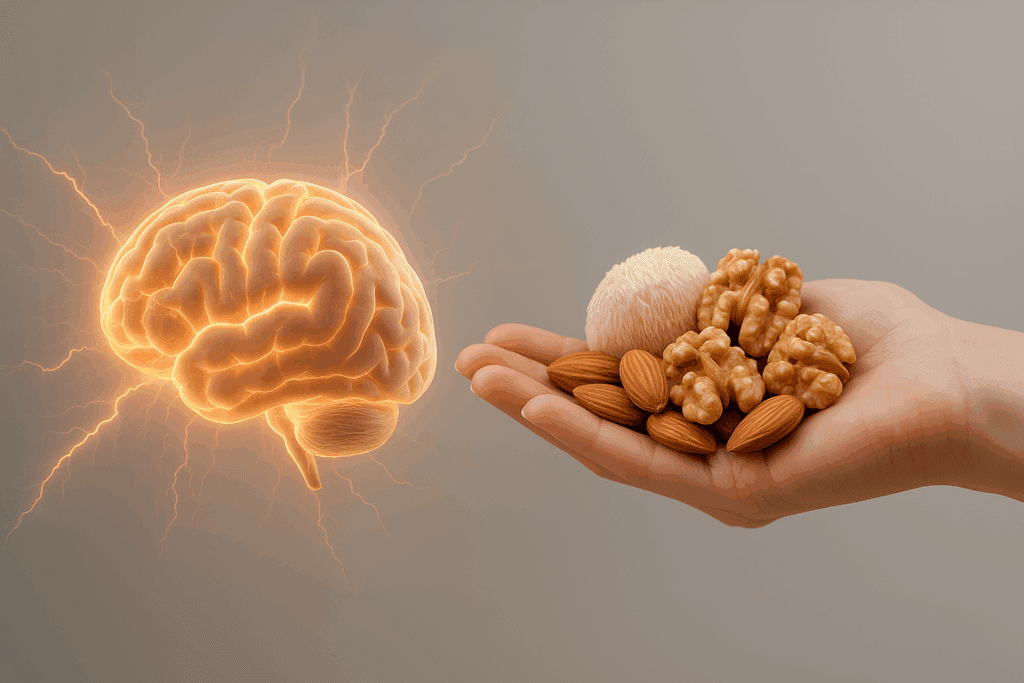
Nuts Energy Food and Cognitive Performance Under Stress
One of the most debilitating effects of chronic stress is cognitive decline, often manifesting as forgetfulness, difficulty concentrating, and mental fatigue. These symptoms stem from the neurochemical disruptions caused by elevated cortisol and inflammatory mediators in the brain. Fortunately, both adaptogenic mushrooms and nuts energy food have been shown to protect and enhance cognitive performance, even under pressure.
Lion’s mane mushroom, as mentioned earlier, promotes neurogenesis and synaptic plasticity by increasing levels of NGF. In aging populations, it has been associated with delayed cognitive decline and improved memory retention. In younger individuals, it appears to enhance focus and verbal fluency—two faculties often impaired during high-stress periods.
Nuts complement these effects by supporting the structural and functional health of the brain. Walnuts, in particular, are high in DHA, a type of omega-3 fatty acid that comprises a significant portion of the brain’s gray matter. Regular walnut consumption has been correlated with better memory, faster processing speeds, and improved stress coping abilities in both observational and intervention studies.
Together, these foods form a neuroprotective duo that enhances resilience and performance. A breakfast combining lion’s mane-infused coffee and a walnut-banana smoothie offers a scientifically sound, cognitively supportive start to the day. Over time, this kind of consistent nourishment can reverse the subtle erosion of cognitive faculties caused by stress, improving quality of life and professional output.
Potential Side Effects and Safety Considerations
As with any therapeutic intervention, even natural ones, it is important to consider safety and individual variability. While adaptogenic mushrooms and nuts are generally well-tolerated, certain populations should exercise caution.
Individuals with mushroom allergies should obviously avoid fungal adaptogens, though true allergies are rare. More commonly, people may experience digestive discomfort, particularly when taking high doses of certain mushroom extracts like chaga or reishi. Starting with small doses and monitoring one’s response is key to minimizing adverse effects.
Nuts, on the other hand, are among the most common food allergens. Peanut and tree nut allergies can be severe and even life-threatening. Even for those without allergies, nuts are calorie-dense and should be consumed in appropriate portions to avoid unintended weight gain, especially in sedentary individuals. Additionally, people with compromised gallbladder or pancreatic function may have difficulty digesting the fats in nuts, warranting medical guidance.
Drug interactions are another consideration. Adaptogens like cordyceps may have mild anticoagulant properties, while reishi may interact with blood pressure medications. Therefore, anyone taking pharmaceuticals should consult with a qualified healthcare provider before starting a new adaptogen regimen.
Finally, sourcing and quality are paramount. Due to the popularity of adaptogenic mushrooms and nuts energy food, the market has been flooded with low-quality, contaminated, or poorly processed products. Consumers should look for third-party testing, organic certifications, and clear extraction methods (e.g., dual-extract for mushrooms) to ensure efficacy and safety.
Nuts Energy Food in Cultural and Culinary Contexts
The power of nuts energy food is not limited to clinical or nutritional contexts—it has deep cultural roots and culinary applications that enhance its accessibility and enjoyment. Across cultures, nuts have been revered as both food and medicine, often appearing in rituals, festive meals, and healing traditions.
In Ayurveda, almonds are soaked overnight and peeled in the morning for their sattvic (pure, balancing) qualities. In Mediterranean cuisine, walnuts and pine nuts are staples in sauces, spreads, and salads. Middle Eastern diets often include pistachios and cashews in both sweet and savory dishes, offering a rich source of energy in arid climates where caloric density is crucial.
These traditions offer inspiration for modern applications. Nut butters, spiced nut mixes, and mushroom-nut energy bars are all innovative ways to make stress-relief nutrition both practical and enjoyable. Pairing adaptogenic mushrooms with nut-based recipes not only supports health but also aligns with sustainable and culturally rich food practices.
Frequently Asked Questions (FAQ): Adaptogenic Mushrooms and Nuts Energy Food for Stress Relief
How do adaptogenic mushrooms interact with the nervous system on a long-term basis?
Adaptogenic mushrooms don’t just offer a short burst of calm; they actually influence how the nervous system recalibrates itself over time. Long-term use of mushrooms like reishi and lion’s mane encourages a more balanced release of stress hormones such as cortisol and adrenaline. These mushrooms help condition the hypothalamic-pituitary-adrenal (HPA) axis to respond more appropriately to stimuli, which can prevent overreaction to minor stressors. Moreover, lion’s mane supports myelination and nerve regeneration, enhancing long-term neurological resilience. When incorporated consistently, these adaptogens can train the body to become less reactive and more adaptable in the face of daily stress.
What’s the role of diet diversity when including nuts energy food in a stress-relief routine?
While nuts energy food is undoubtedly beneficial, relying solely on a few nut varieties can limit nutritional range and reduce therapeutic impact. Different nuts offer different ratios of fatty acids, antioxidants, and micronutrients. For instance, almonds are excellent for magnesium, while walnuts shine in omega-3s and Brazil nuts in selenium. Diversifying nut intake helps cover various physiological needs, especially when managing chronic stress. Creating a rotating nut schedule—much like a meal rotation plan—ensures broader nutrient coverage without triggering sensitivities or creating digestive fatigue.
Do nuts give you energy in cold or low-sunlight environments?
Yes, and interestingly, their impact may be even more pronounced under such conditions. During colder months or in regions with limited sunlight, the body tends to burn more energy maintaining thermal regulation and mood stability. Nuts energy food provides dense calories and essential fats that support thermogenesis—the body’s internal heat production. Additionally, vitamin D deficiency, common in low-sunlight regions, has been linked to fatigue and depression, and while nuts aren’t high in vitamin D, they support mood-related pathways that compensate in part. Including nuts in winter diets or in shift workers’ routines can help buffer against seasonal dips in energy and morale.
Can adaptogenic mushrooms support emotional resilience during major life changes?
Absolutely. Major transitions like job changes, relocations, or grief periods heavily tax the limbic system—the brain’s emotional command center. Adaptogenic mushrooms like cordyceps and reishi can buffer the body’s response, reducing the intensity of physiological arousal and emotional overwhelm. They work indirectly through hormonal modulation and neurotransmitter balance, fostering a grounded internal environment. Over time, users often report enhanced clarity, patience, and emotional control, even amidst unpredictable or chaotic circumstances. They become particularly effective when combined with mindful practices such as breathwork or meditation, which further engage the parasympathetic nervous system.
How can nuts energy food be optimized for active individuals or athletes under stress?
For physically active individuals, stress comes not just from emotions but also from physical strain. Nuts energy food offers dual benefits: it fuels muscular repair and sustains mental endurance. Pairing high-protein nuts like pistachios or peanuts with carbohydrate-rich fruit pre- or post-workout creates a metabolic synergy. This combination stabilizes blood sugar and supports glycogen replenishment, aiding in faster recovery and reducing exercise-induced cortisol spikes. Athletes who incorporate adaptogens like cordyceps with nuts report increased stamina, better mood stability during training cycles, and a notable decrease in performance-related burnout.
What are some innovative ways to consume nuts energy food without adding sugar or preservatives?
The cleanest way to benefit from nuts energy food is through whole, raw, or lightly roasted forms. However, culinary creativity can elevate their impact. Homemade nut butters without added oils or sugars can be flavored with cinnamon, turmeric, or cacao for additional anti-inflammatory effects. Another option is making energy balls using dates, chia seeds, and almond flour—a nutrient-dense snack that avoids commercial fillers. Incorporating ground nuts into soups, stews, or mushroom broths adds satiety and texture without relying on processed ingredients. Such preparations ensure therapeutic nutrients are preserved while enhancing flavor and convenience.
Do nuts give you energy immediately or over time—and how can this be leveraged for daily planning?
The answer is both, but in different ways. When people ask, “do nuts give you energy?” it’s essential to distinguish between immediate satiety and sustained metabolic support. Simple sugars provide instant energy spikes, while nuts release calories and nutrients more gradually due to their fat and fiber content. For quick energy, pair nuts with a small amount of fruit to create a glycemic bridge that kicks in quickly and lasts longer. Consuming them strategically—like in mid-morning or late-afternoon—helps maintain stable energy between meals and reduces the likelihood of energy crashes.
Are there emerging trends in combining nuts energy food with adaptogenic supplements?
Yes, the wellness market is evolving with integrative formulations that unite adaptogens and nuts into convenient formats. Brands are developing mushroom-infused nut butters, trail mixes with dried adaptogenic mushroom powders, and energy bars featuring both reishi and walnut-based protein. These innovations reflect a growing understanding of the synergy between adaptogens and nuts energy food in managing both acute and chronic stress. Such products cater to busy professionals, travelers, and athletes who seek portable, functional nutrition without synthetic additives. While still relatively new, these blends are gaining traction in health-conscious circles for their multi-dimensional support.
Can adaptogens and nuts be used for managing social anxiety or performance pressure?
While not a standalone treatment, combining adaptogens and nuts energy food can subtly reduce symptoms of social anxiety. Reishi and ashwagandha, in particular, lower baseline arousal levels, helping individuals feel less jittery before public speaking or social events. Nuts, especially those rich in magnesium and tryptophan, support neurotransmitters like GABA and serotonin that regulate mood and ease social inhibition. Over time, this dietary strategy may build physiological resilience that reduces anticipatory anxiety. For those regularly facing high-stakes meetings or presentations, a pre-event snack featuring these elements can provide calm, focused energy.
How do different forms of adaptogens (teas, capsules, tinctures) influence their synergy with nuts energy food?
The delivery method of adaptogens can alter how they interact with accompanying foods like nuts. Teas, for instance, are water-extracted and may pair well with fat-soluble nutrients in nuts, enhancing overall absorption when consumed together. Tinctures, often alcohol-based, bypass the digestive process quickly and may be more suitable when taken on an empty stomach, followed by a nut-based snack to buffer their intensity. Capsules offer precise dosing and work well alongside structured meals containing nuts energy food, ensuring a full-spectrum nutrient uptake. Choosing the right format depends on individual lifestyle, digestion, and therapeutic goals—but synergy with nuts enhances both bioavailability and efficacy.
4o
Conclusion: Nourishing Resilience with Adaptogens and Nuts Energy Food
The path to genuine stress relief is neither narrow nor quick—it is a multifactorial journey involving diet, lifestyle, emotional awareness, and biochemical support. As we’ve explored, adaptogenic mushrooms and nuts energy food offer a dynamic and evidence-backed approach to this journey. Rather than functioning as temporary fixes, they nourish the body’s core systems—neurological, endocrine, and metabolic—thereby enhancing its natural ability to adapt, recover, and thrive.
Whether you’re combating workplace burnout, managing emotional overwhelm, or simply striving for greater mental clarity, integrating these natural tools into your daily life can make a profound difference. From lion’s mane-infused smoothies to reishi cashew elixirs, the possibilities are as enjoyable as they are healing. With careful selection, mindful preparation, and consistent use, the combination of adaptogens and nutrient-dense nuts can transform stress from a chronic burden into a manageable, even transformative, part of life.
Ultimately, when someone asks “do nuts give you energy?” or seeks natural ways to regulate stress, this guide serves as both a scientific resource and a practical roadmap. Grounded in ancient wisdom and validated by modern research, these nutritional strategies not only offer relief—they empower resilience.
Further Reading:
Nuts, Energy Balance and Body Weight
Nuts Improve Diet Quality Compared to Other Energy-Dense Snacks While Maintaining Body Weight
